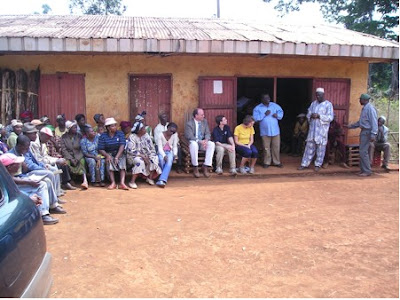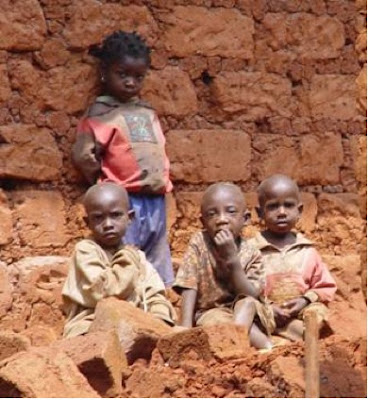Yes, another busy day and we have tons of information. I won’t go into all the details here, but we have many pages of notes.
First thing in the morning, we met with Marcel Fotim, the man from Hydrosanté. It’s a local NGO with a small office in Bamendjou. He
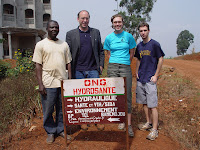 told us that they work for better water and health (santé) in the area. For example, there was a cholera outbreak here two years ago with a number of deaths. They conducted a survey and education campaign in that village, and he showed us the survey and their literature. They work as volunteers and don’t even have the funds to make as many copies as they would like to distribute. Marcel took us on a field trip of two water systems in a part of Bamendjou we have not seen before. First we saw a pretty s
told us that they work for better water and health (santé) in the area. For example, there was a cholera outbreak here two years ago with a number of deaths. They conducted a survey and education campaign in that village, and he showed us the survey and their literature. They work as volunteers and don’t even have the funds to make as many copies as they would like to distribute. Marcel took us on a field trip of two water systems in a part of Bamendjou we have not seen before. First we saw a pretty s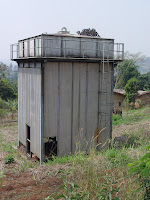 izeable system put in by a Danish company, 15-20 years ago, with a gas-driven pump collecting creek water, a chlorination system, a large storage tank, and distribution to standpipes over a pretty large area. He said that the system only worked for a very short time because the villagers and chief did not reach agreement on how to pay for the necessary fuel. Everything still looked functional but the pump and motor had been removed. Then we hiked down to the creek and saw a system that diverted water down a long pipe to a ram pump, which sends some of the water further up the opposite rise to a monastery, where they apparently have a filtration system to clean the water. This setup is about 25 years old and functions well. It uses no fuel because the water pressure from the overall flow is used to send a fraction of the water to a higher elevation.
izeable system put in by a Danish company, 15-20 years ago, with a gas-driven pump collecting creek water, a chlorination system, a large storage tank, and distribution to standpipes over a pretty large area. He said that the system only worked for a very short time because the villagers and chief did not reach agreement on how to pay for the necessary fuel. Everything still looked functional but the pump and motor had been removed. Then we hiked down to the creek and saw a system that diverted water down a long pipe to a ram pump, which sends some of the water further up the opposite rise to a monastery, where they apparently have a filtration system to clean the water. This setup is about 25 years old and functions well. It uses no fuel because the water pressure from the overall flow is used to send a fraction of the water to a higher elevation.The contrast is stark and shows that any system we might install should consider very carefully what went wrong with the Danish system. The problem seems to have been that there was no institutional means of paying for fuel costs, rather than the level of technology, so one might think that a solar system would circumvent this. Still, the simplicity of the ram pump setup is appealing. So today we will look for elevation gradients near Bakang that would accommodate this. In general, we’re at a higher elevation where the flows may not suffice.
As if that was not enough to take in, we then went to Bafoussam to talk with the General Director of SNEC for the region. That’s the national water company. We had already seen that they have a water treatment plant between Bafoussam and Bamendjou. That’s where the water comes from that fills the storage tank in Bamendjou. The treatment plant was built by the French about 20 years ago. Our big question was whether this system could be extended to Bakang. There are really three questions: first, whether there is enough system capacity to serve the additional demand; second, what would be involved in getting the flow from existing lines out further to Bakang; and third, whether the water is affordable. The director said there was plenty of water, but we looked at the topo map together and the deep valley between Bamendjou and Bakang makes the extension somewhat challenging. He says the water price is affordable because it’s set by the government – we have heard differing opinions on this issue.
So that’s our learning for the day. We’ve had some random and funny experiences that Amelia promises to add to this! - Dr. Steve
Random observations from Amelia et al.:
· Probably, one of the strangest things that happened was while we were attempting to do the pump test. An old lady (the same one who danced with Sam during our last visit) came up to us, pulled a couple porcelain vials out of her purse while speaking Patois so we did not understand a word she said. She grabbed each of our LEFT hands and sprinkled a bit of ashes (of what we were not sure) and then mixed it with some dirt-like fine powder. Then she told us to lick up this concoction and she showed us how. Needless to say we passed up this wonderful opportunity.
· Another crazy story happened while we were in Bafoussam. We were just driving along trying to go visit a company and we came across a beer truck flipped on its side (how that happened we have no idea, but excess speed around the traffic circle is a likely cause). The people around this accident decided to help in the clean up and take some of the beer off of the truck. One man was standing on the sideways truck drinking his beer. This was even while the police were standing nearby!
· We have had some issues with the food we are eating. Martine is a well intentioned cook for us, but her repertoire seems limited. There are these reoccurring fish heads that seem to never die. The fish really isn’t to our liking but they seem to want to be with us for some reason and every meal includes a fish head looking at us.
· Our driver’s name is Guy (pronounced Gee) and he has the greatest ring tone that we have ever heard. It says “Ring Ring..Ring Ring..Your telephone is ringing” with a gradually increasing volume.
· My room is right by the gate that we are walking into the house in and there is a goat that lives right next to it. This animal has the most inconsistent sleep habits and it wakes up at all different times of the morning ( baaa …..baaaaa …….BAAAAAA………etc.). I never thought I would say that I am looking forward to sleeping in a bustling city but I think that I am.
· The other day we were going into Bafoussam and a log truck was stuck sideways in the road. To let drivers know that there is a problem up ahead, they place branches in the road. I guess it is an effective system. So there were cars and motorcycles backed up. Apparently the truck could not make it up the hill. After some discussion and whatever, they took the logs off the truck, dragged it back to the right direction, and pushed it up the hill. This was probably all the people from the bus that was waiting nearby. We don’t know if they came back for the logs…
· We are driving all over the place to talk to various people and our driver is really great about getting us where ever we need. The only issue we have is the music that we are listening to while we are going places. He has just a few CD’s that are (1) old country music, (2) instrumental American classics and (3) the evangelical Christian CD. While all of these could be good on there own, they tend to get really old after about four times. We bought him some new CD’s but he has made it clear that he prefers his own music. We paid 2500 CFA (about 5 bucks) for three CD’s but one only works on the computer, not his car CD player, and you get these odd music videos with it.
· There is this huge hole in the road on the way to Bafoussam. Basically, you really can’t see the bottom of it and your car will be lost in this hole. Along this road, I noticed a random sign that said “Danger de Mort” i.e. “Danger of Death”. Needless to say this has really caught our attention. The mayor claims that it is just an electrical plant, but the sign says “thermal generation.” We think that there is some sort of illegal testing going on there that they are trying to hide. We are going to try to find pictures of it on Google earth when we get back.
· Most people who live around here travel to various locations via bus. These are normal busses that you would find in the states and we all feel like we have been on one that is overcrowded with people and stuff. You have no idea how much you can fit on these busses. They pile people in (its so not safe) and then just keep putting stuff on top. They look like they are going to tip over as there is as the stuff on top is as high as the bus itself.
· Nura, the PCV, told us how she learned how to tie a string onto a cricket. She said that the little girls take their crickets for walks and the little boys are training them to fight with each other.
· We originally thought that many areas of Cameroon are booming with lots of construction, and scaffolding around buildings made of logs. But on closer inspection it becomes obvious that most of these projects were left unfinished in previous years. Nobody has the money to finish them or, for that matter, take down the scaffolding (let alone the structures themselves). Not so funny, just different.
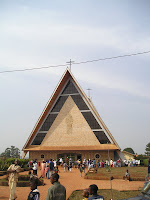 yping this on the laptop on a very bumpy road to Bafoussam!) – but it turned out to be loaded. We started out going to mass at the church on Mr. Mukam’s invitation and the service was quite different from what any of us are used to. This was the second service, which is in French and for the younger set; the early ser vice is in the local language for most of the locals. Singing was at least two thirds of the program and a wonderful mix of African traditional, Western hymns, and age-old Catholic chants. There was also a baptism included in the service.
yping this on the laptop on a very bumpy road to Bafoussam!) – but it turned out to be loaded. We started out going to mass at the church on Mr. Mukam’s invitation and the service was quite different from what any of us are used to. This was the second service, which is in French and for the younger set; the early ser vice is in the local language for most of the locals. Singing was at least two thirds of the program and a wonderful mix of African traditional, Western hymns, and age-old Catholic chants. There was also a baptism included in the service.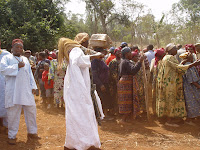 e left quickly, though, to get a view of the dancing as it began. There was traditional percussion and chanting by a central group while crowds formed lines that circled around the musicians. Apparently, when the music briefly stopped, a different part of the family would take over the music, and new groups of dancers would also crowd in. The daughters carried bags of the chief’s clothes on their heads, and there was a group of widows on the periphery who, per tradition, were holding empty pots. Since the mayor was asked to join the circling throngs, we followed as well and went around several times.
e left quickly, though, to get a view of the dancing as it began. There was traditional percussion and chanting by a central group while crowds formed lines that circled around the musicians. Apparently, when the music briefly stopped, a different part of the family would take over the music, and new groups of dancers would also crowd in. The daughters carried bags of the chief’s clothes on their heads, and there was a group of widows on the periphery who, per tradition, were holding empty pots. Since the mayor was asked to join the circling throngs, we followed as well and went around several times.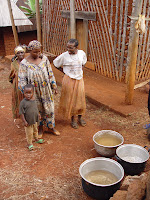 bad, so most people only use it for washing. They go to the stream for their drinking water and don’t believe that it is harmful. So it seems like (a) education is in order, and (b) a means of treating the well water is needed. Of course, this is not what the water committee sees as the priorities. We’ve got a lot of work to do.
bad, so most people only use it for washing. They go to the stream for their drinking water and don’t believe that it is harmful. So it seems like (a) education is in order, and (b) a means of treating the well water is needed. Of course, this is not what the water committee sees as the priorities. We’ve got a lot of work to do.